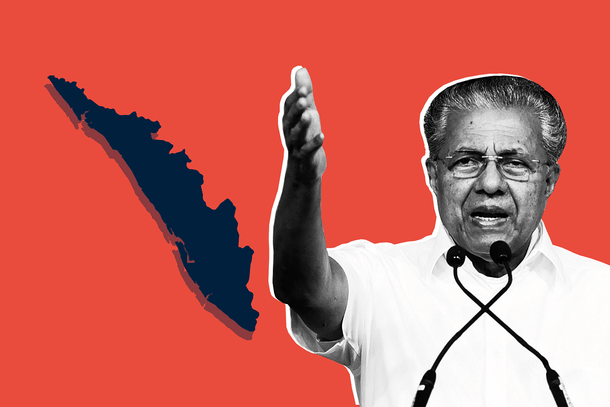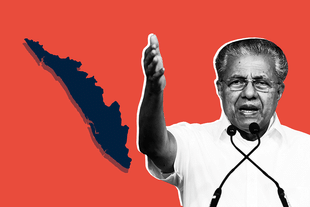Politics
Pinarayi Vijayan Wades Into 'Sanatana Dharma' Row — May Actually Lose Votes Because Of It
S Rajesh
Jan 04, 2025, 08:38 AM | Updated Jan 05, 2025, 05:05 PM IST
Save & read from anywhere!
Bookmark stories for easy access on any device or the Swarajya app.


Kerala Chief Minister Pinarayi Vijayan’s recent remarks saying that it was wrong to associate Sree Narayana Guru with Sanatana Dharma have elicited sharp reactions from the Bharatiya Janata Party (BJP) and V D Satheesan, the leader of the opposition.
The remarks — in which Vijayan described Sanatana Dharma as the "caste system" that Narayana Guru fought against — reminded people of Udhayanidhi Stalin’s defence after he compared Sanatana Dharma to diseases like malaria and dengue and called for it to be eradicated.
He too had said that he meant the caste system and not the Hindu religion when he used the term Sanatana Dharma. Contending that he had not said anything wrong, he refused to apologise, in spite of the remarks receiving widespread condemnation.
While it is unclear if Vijayan was inspired by Udhayanidhi, the general consensus is that the remarks were made to woo back voters of the Ezhava community — traditional supporters of the Left who have started moving towards the BJP in recent years.
The Ezhavas, also known as Thiyyas, are one of the major Hindu communities of Kerala, along with Nairs. They form around 23 per cent of the population of the state and are classified as an Other Backward Class (OBC) community. Traditional occupations of the community include toddy tapping, agriculture labour, weaving and the practice of Ayurveda.
Even up to the 1920s and 1930s, the community was subjected to various forms of caste-based discrimination, such as denial of entry into temples and being barred from using certain roads.
This was the milieu into which Narayana Guru was born. During his lifetime, he spoke up against untouchability and caste-based discrimination and worked for the welfare of the downtrodden. Among his notable initiatives were the consecration of temples that were open to members of all castes.
His social service organisation, the Sree Narayana Dharma Paripalana Yogam (SNDP Yogam), was started in 1903.
Historical Support for Communists
Given the memories of caste-based discrimination and the support of communists for issues like labour rights, higher wages, and land reforms, the Ezhavas were naturally drawn to their camp. Leaders from the community were given good positions in the party, and two of them — V S Achuthanandan and Vijayan — went on to become chief ministers of the state with long tenures.
However, the Yogam, which today has a vast network of institutions across the state, was never completely with the communists. A party formed by it in the 1970s supported the Congress-led United Democratic Front (UDF). Some groups within the institution were also close to the Rashtriya Swayamsevak Sangh (RSS).
The Bharat Dharma Jana Sena (BDJS), the Yogam's current political wing, is an ally of the BJP.
Shift in Ezhava Allegiance
According to political commentators this writer spoke to, the recent reduction in support for the Left among Ezhavas is due to two major factors — the CPI(M)'s increased appeasement of Muslims in an attempt to wean them away from the UDF and dissatisfaction with Vijayan's governance.
However, the seeds of this shift were sown about a decade ago with the formation of the BDJS and its subsequent alliance with the BJP. The movement is thus an ongoing process, with the 2016 assembly and 2019 Lok Sabha elections marking its two peaks. The 2021 assembly election witnessed a relatively lesser shift in Ezhava votes.
This trend is not confined to certain parts of the state; it is a pan-Kerala phenomenon. Lok Sabha constituencies like Attingal and Alappuzha, where two of the BJP's well-known Ezhava leaders, V Muraleedharan and Sobha Surendran, contested, are where this movement in votes was most noticeable.
While the BJP finished third in both constituencies, it lost Attingal by a small margin and increased its vote share in Alappuzha by over 10 per cent.
"More than the shift in Attingal and Alappuzha, what is worrying the CPI(M) is that they have started losing Ezhava support even in their traditional strongholds in northern Kerala, like Kannur and Kasaragod. The movement there is smaller but significant enough to make them worry," one of the commentators observed.
Remarks May Galvanise Ideological Base but Hurt Party Prospects
The CPI(M) leadership in Kerala has recently realised that its strategy to woo Muslim voters during the 2024 elections has largely failed. Its strong pro-Palestine stance, strident opposition to the Citizenship Amendment Act (CAA), and state secretary M V Govindan’s assertion that the Indian Union Muslim League (IUML) is "secular" did not yield the desired results.
In response, a series of remarks interpreted by commentators as "remedial measures" have been made to win back the party’s Hindu supporters, particularly the Ezhava community.
While Chief Minister Pinarayi Vijayan denied making comments linking seizures of smuggled gold and hawala money to the Muslim-majority Malappuram district, his subsequent statements — such as calling the IUML chief a follower of the Jamaat-e-Islami and politburo member A Vijayaraghavan attributing Rahul Gandhi and Priyanka Vadra’s victories in Wayanad to a ‘communal Muslim alliance’ — suggest a deliberate change in approach.
This shift is believed to have helped the CPI(M) in recent bypolls.
However, Vijayan's comments about delinking Sree Narayana Guru from Sanatana Dharma might derail this strategy. "You do not want to upset a section of a community when your goal is to woo them back," said a CPI(M) leader critical of the remarks.
"There is no 'Ezhava issue' distinct from the broader concerns of the Hindu community. For instance, love jihad is as much a threat to Ezhavas as it is to Hindu society. So, it’s unlikely they would want to identify differently from the rest of their Hindu brethren," he added.
A Communist Party of India (CPI) worker from Wayanad remarked, "Vijayan became too ideological while speaking. This will resonate with the party's committed voters but not with the Ezhava community at large.
"Such comments are not new. Just as the Dravida Munnetra Kazhagam in Tamil Nadu accuses the BJP of saffronising Thiruvalluvar, communists in Kerala have often accused the Sangh Parivar of appropriating Narayana Guru. But this time, Vijayan crossed the line — it’s like shooting oneself in the foot."
Predictably, the BJP seized the moment to emphasize that Narayana Guru’s teachings and reforms were rooted in Hinduism.
Calling Vijayan's remarks insulting, BJP state president K Surendran wrote, "CM @pinarayivijayan's remarks at Sivagiri insult Sree Narayana Dharma and Gurudevan. Viewing Gurudevan merely as a social reformer exposes his narrow mindset. Gurudevan is revered by Hindus and authored more than 60 books propagating and advancing the ideals of Sanatana Dharma."
He also demanded an apology: "Would Pinarayi dare to criticise other religions with the same audacity? His selective targeting of Hindu traditions highlights his hypocrisy. He must publicly apologise for his disparaging comments."
The CPI(M) also faces complications from the Congress, which has not fully backed Vijayan’s stance.
While Congress state unit chief K Sudhakaran aligned with Vijayan by stating that there was an effort to confine a universal figure like Narayana Guru within the framework of the varna system under the guise of Sanatana Dharma, opposition leader V D Satheesan took a contrasting view.
Satheesan said that the chief minister’s remarks were wrong because Sanatana Dharma encompasses cultural traditions like Advaita, Thathwamasi, the Vedas, and the Upanishads. "Sree Narayana Guru also spoke about the relevance of Sanatana Dharma. There is no communal element in the concept. The chief minister misinterpreted it. He should not drive Hindus into the RSS camp," Satheesan said.
Satheesan’s broader interpretation is expected to work in favour of the BJP and help it to drive its point home — that Sanatana Dharma and Hinduism are one and the same, notwithstanding what Udhayanidhi or Vijayan may say.
Although the next elections are over a year away, and these remarks may not dominate voters’ minds by the summer of 2026, they have nevertheless complicated things for the CPI(M).
S Rajesh is Staff Writer at Swarajya. He tweets @rajesh_srn.





